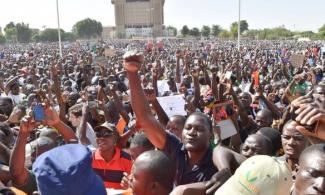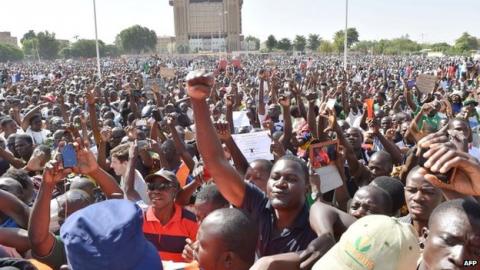
How much is Blaise Compaore and the men who served in his 27 year old government worth? There is a need for Africans to start asking questions and putting pressure on France and other nations who proclaim to be in support of the ideals of democracy and good governance to confiscate the ill-gotten wealth of the ousted president and his cronies that was put in their countries. The Burkinabes should do all in their power never to fall into a similar situation that Nigeria fell into over the incomplete repatriation of the laundered sums stolen by the ruthless dictator- Sanni Abacha.
“But revolutions solve nothing on their own; it’s what comes next that really counts. Unfortunately, Africa’s recent track records in this department is poor”- Simon Allison.
While celebrating the life and times of Thomas Sankara, I argued in clear terms that this charismatic Burkinabe who ruled the landlocked country between 1983 and 1987 taught us lessons.

If the 27th anniversary of the death of Sankara presented us a rare opportunity of learning from Burkina Faso, then the resignation of Blaise Compaore on the 31st of October in what has been termed as the ‘black uprising’, has also afforded Burkina Faso to learn from herself and the rest of the world.
The aftermaths of revolutions are not always palatable mainly because of unseen complications that arise as the newly-toppled sabotage efforts to move in a new direction.
The movement of the people of 28th October which saw half a million citizens of Burkina Faso move against an inimical amendment to the constitution that would have paved way for Compaore’s continued rule resulted in turmoil for the nation.
What comes next is of a major concern if the land of upright men is not to fall into the same faith that befell nations engulfed in a similar upheavals on the continent.
The first lesson for Burkina Faso is from within herself. The ethical and intellectual period of Sankara’s leadership is the first lesson for Burkina Faso. Sankara lived a frugal life. One that eschewed greed, opulence and crass materialism. The first step in restoring Burkina Faso back to the old days of the African Che either as a transitional government or a constitutional one would be to skillfully separate the revolutionaries from the counter revolutionaries, the run-of-the-mill politicians from the out-of-the-way politicians, the colourful activists from the opportunists and the nationalists from those that uphold elitism. We know them here in Nigeria; you also recognize them over there.
If after ousting Compaore, the good people of Burkina Faso settle for a democracy that has elements of dictatorship and indiscipline, it would not only amount to a betrayal of the fallen heroes of the revolution that has been put between four and thirty. It would be a clear signal to other despots to further hold on to their selfish ideals. The revolutionaries must never settle for anything short of the outcomes of the 16th century French revolution that ushered in classical liberalism, social liberalism and the principles of enlightenment.
A second lesson for Burkina Faso resides in the aftermath of the Arab spring vis-a-vis its causes, goals and how far the goals have been achieved. According to Wikipedia, the causes of the Arab spring were authoritarianism, demographic social factors, political corruption, human rights, inflation, imperialism, kleptocracy, sectarianism and unemployment. This serves as a powerful lesson for every conscious participant of the Black Spring. Compaore either as an individual or a government, just like his counterparts in Zimbabwe, Uganda, Cameroon, Angola and Equatorial Guinea reflects such sordid characteristics.
The goals of the revolt, according to the free encyclopedia were to enthrone democracy, free elections, human rights, employment and regime change. A thorough look at the realities in post Mubarak’s Egypt, post Gaddafi’s Libya and post Ali’s Tunisia speak volumes of the disappointing nature of black revolutions.
Burkina Faso could be worse hit by this phenomenon due to its poor economy which was labeled by Euromoney as the 111th safest investment destinations in the world. The situation becomes more grim when one considers that the United Nations Development Program places Burkina Faso on the lowest level of literacy in the world.
Between Mubarak, Gaddafi and Ali lies a whopping sum of $300 billion dollars, which is yet to be recovered from foreign bank accounts mostly in Europe. As Abdelmalek Alaoni puts it: “Yet beyond those troubled doldrums, there is one issue that is very frustrating for the populations of countries struck by the Arab revolutions: the failed attempts so far at recovering the hidden “treasures” of fallen dictators Hosni Mubarak, Zine El Abidine Ben Ali, and the late Muammar Gaddafi.” Burkina Faso should learn from this.
How much is Blaise Compaore and the men who served in his 27 year old government worth? There is a need for Africans to start asking questions and putting pressure on France and other nations who proclaim to be in support of the ideals of democracy and good governance to confiscate the ill-gotten wealth of the ousted president and his cronies that was put in their countries. The Burkinabes should do all in their power never to fall into a similar situation that Nigeria fell into over the incomplete repatriation of the laundered sums stolen by the ruthless dictator- Sanni Abacha.
Another lesson for Burkina Faso is summed up in the words of Keith Reinhard. According to the chairman emeritus of DDB (Doyle Dane Bernbach) worldwide, “Barack Obama is three things you want in a brand- new, different and attractive. That’s as good as it gets.” Clearly, this can neither be said about the military in general nor the interim head of government- Colonel Isaac Zida in particular.
Any system of government that does not derive its legitimacy from the people is never attractive. The lesson for Burkina Faso here is that a revolution transcends a mere change of the leadership of a nation. A successful revolution is one that overhauls the social and political order. The 17,322,796 Burkinabes should speak with one voice in not only forcing the men in uniforms out of power but to guide their fatherland to the promise land through active participation in the electoral process.
To everyone that has contributed in one way or the other in creating a free and just Burkina Faso, I say “our homeland or death, we will win”
The writer is Modiu Olaguro, a final year student at the University of Lagos, Nigeria. Email: [email protected], Twitter: @digits90